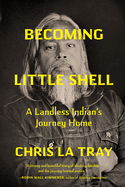
Montana Poet Laureate and bookseller Chris La Tray's third book, the graceful and determined memoir Becoming Little Shell, interweaves his experiences with the history of Indigenous peoples to craft a love letter to family and natural landscapes.
As he grew up just outside Missoula in the 1970s, La Tray (Descended from a Travel-Worn Satchel) was dimly aware of his paternal Chippewa ancestry, but he knew that his father had always rejected Indigenous identity. A series of family funerals prompted the author to delve into his genealogy and the history of the Little Shell Tribe of Chippewa Indians. His quest was also inspired by historian Nicholas Vrooman's book about the Little Shell; Vrooman's presentation at a 2013 book festival, La Tray writes, "altered the course of my life."
Moving between past and present, La Tray enmeshes his own wanderings--rock-star dreams in Seattle, Wash., reservation life in the late 1990s, working in Ohio--with those of the Métis people, the "entire mixed-race culture and ethnicity" of descendants of Indigenous people who intermarried with early European explorers and traders. Métis people created vibrant fashion, food, and musical traditions, but like many Indigenous peoples, they, too, were "buffeted by generations of trauma," including genocide, cultural suppression, deportation, and insultingly paltry government compensation.
La Tray writes beautifully about Montana's vistas and wildlife. For him, nature, as much as a sense of community and belonging, has restored his mental health. Nineteenth-century Chief Little Shell fiercely advocated for his people's rights; La Tray's enrollment in the Little Shell Tribe and the tribe's successful 2019 campaign for federal recognition honor that legacy. --Rebecca Foster, freelance reviewer, proofreader and blogger at Bookish Beck

